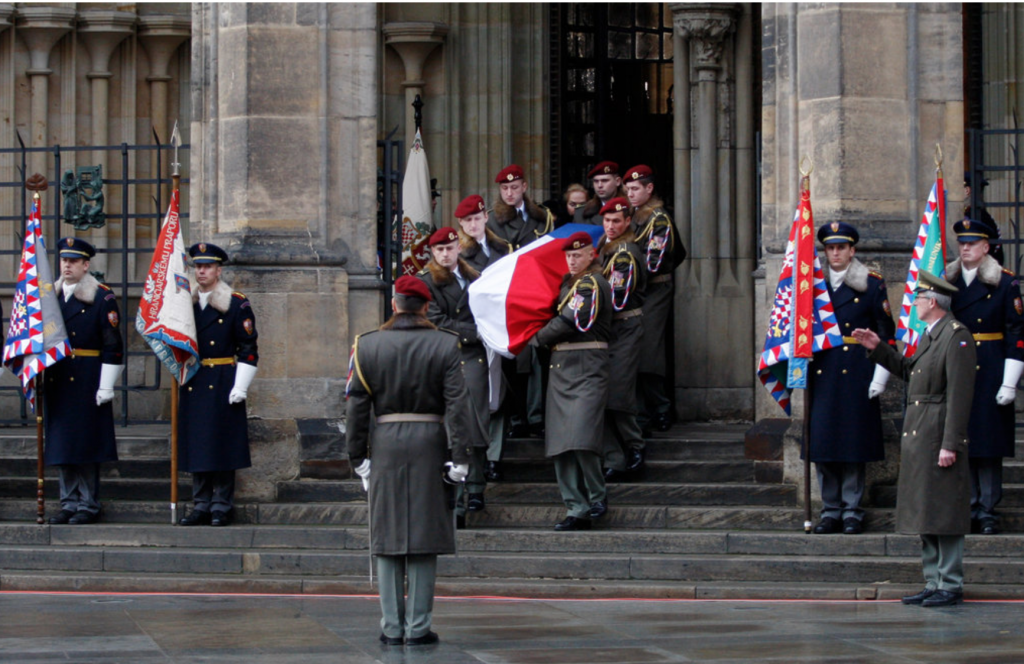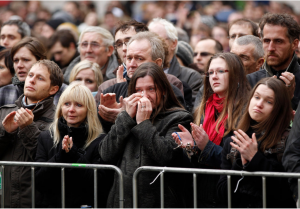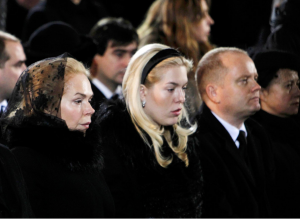Mourners in Prague Honor Havel
Source: The New York Times /
Mourners filled the historic St. Vitus Cathedral here on Friday and gathered outside by the thousands on a frigid December morning for the funeral Mass of the playwright, dissident and former president Vaclav Havel, an emotional outpouring of affection that largely eluded him in his later life.
From a horse-drawn carriage for his coffin at Wednesday’s procession to Prague Castle to the Czech Philharmonic Orchestra playing Dvorak’s “Requiem” on Friday, the government spared no expense to honor Mr. Havel, who died on Sunday at the age of 75.
Over the three days of official mourning, Czechs have relived parts of the Velvet Revolution that Mr. Havel led, jingling their keys and wearing tricolor flag ribbons. After perhaps overstaying his welcome in nearly 13 years as president, first of Czechoslovakia and then of the Czech Republic, Mr. Havel’s demise appeared to revive a long-neglected attachment, visible now in the votive candles, flowers and handwritten thank-yous on everything from scraps of paper to bed sheets popping up at makeshift memorials.

“He was a light, is a light and will be a light for many of us,” said Martina Utikalova, 47, a midwife from Kladno who joined thousands of Czechs gathered under large video screens and loudspeakers to watch his funeral Mass at the cathedral.
Her eyes welled up with tears and over her blue scarf she wore a bright red heart-shaped pendant, like the one Mr. Havel drew next to his signature. The symbol is everywhere here in the Czech capital since his death, on memorial billboards, television screens and handmade tributes in store windows.
“Many ridiculed Havel for his words about truth and love,” said Karel Schwarzenberg, the Czech Republic’s foreign minister, in his eulogy Friday. “Yet it is the essence of the human struggle. And we must never give up that struggle,” said Mr. Schwarzenberg, who had served as Mr. Havel’s chancellor.
Mr. Havel’s death came at a difficult moment for the continent he helped to reunite through peaceful resistance, choosing imprisonment over bowing to Communist dictatorship. The debt crisis and high unemployment are threatening to undo much of the progress toward the European unity that Mr. Havel prized.
And on the day of Mr. Havel’s funeral, opposition politicians in Hungary were arrested as they protested in front of the Parliament building in Budapest, saying that Prime Minister Viktor Orban and his Fidesz Party were threatening democracy by concentrating a dangerous amount of power in their own hands.

Czechs’ conflicted feelings toward Mr. Havel can be difficult for foreigners to grasp. The gentle artist with the mustache and the shy smile was extremely popular abroad during the cold war — and at times even more famous than at home, where his plays were banned — as a symbol of bravery and subversive humor in the face of Communist dictatorship. But as Mr. Havel’s role in the fight for freedom receded, his moral stances could verge on the didactic.
In the years after liberation, there was resentment over Mr. Havel’s refusal to ban the Communist Party, which struck many here as naïve or even unjust. His humble insistence that his second career was an accident and that he had never wanted to be a politician had begun to grate by his third term as president. And his rivalry with Vaclav Klaus, the former prime minister and now president, conflicted with the image that Mr. Havel cultivated of himself as being removed from the political fray.
The parent’s guidance and failings chafe the adolescent, even the adolescent nation. But now Czechs can miss this father of their nation wholeheartedly and admire him for what he accomplished with fewer reservations.
When Mr. Havel died, Mr. Klaus issued a statement calling him “the symbol of the contemporary Czech state,” and gave a respectful address at the funeral on Friday, saying that “much is leaving with Mr. Havel” but that his legacy remained.

Leaders from across Europe and around the world joined the people of the Czech Republic to mourn Mr. Havel at the cathedral, part of the sprawling Prague Castle that overlooks the city and the Vltava River below.
From the United States, Secretary of State Hillary Rodham Clinton, former President Bill Clinton and former Secretary of State Madeleine K. Albright honored Mr. Havel. Ms. Albright, who was born here, gave a speech in Czech, saying Mr. Havel “injected light to places of deepest darkness.”
One mourner, Stepan Kosik, 55, said: “Our hopes from 1989 were fulfilled only partly. Not everything we wished for happened.” Mr. Kosik, a driver for a moving company in Prague, added, “But our children are growing up in a completely different society than we did and that is why we are here to thank him.”
Younger Czechs, who had firsthand experience of Mr. Havel only as president, joined in the outpouring. Vilem Kasl, 25, an economics student, was a toddler when the Communist government fell. He took the train to Prague from Pilsen after working an overnight shift at a McDonald’s restaurant. “We will miss his ideals,” Mr. Kasl said.
The funeral on Friday was the culmination of days of remembrances. Some were spontaneous, such as the thousands of votive candles left by admirers at Wenceslas Square. Other events were carefully orchestrated.

Quite a few people questioned whether the lover of the Velvet Underground and Rolling Stones would have wanted the soaring grandeur of Dvorak’s “Requiem” and Handel’s “Messiah.”
“He would have preferred a stage with a rock concert on every square,” said Milan Odstrcil, 29, who brought his 4-month-old daughter to the funeral. Fortunately his friends organized a concert on Friday night at the Lucerna Palace, built a century ago by Mr. Havel’s grandfather.
Inside the cathedral, mourners wore dark overcoats to guard against the December chill as a strong scent of incense hung in the air. An air-raid siren and the ringing of church bells signaled the moment at noon when Mr. Havel’s memory was honored across this country of 10 million.
It was a day of mourning, too, in neighboring Slovakia. Mr. Havel was the first and only post-Communist president of Czechoslovakia before its division.
Jiri Pehe, another former adviser to Mr. Havel, said that compared with 2003, when he left office, the kind of corruption that he had railed against was now a major issue and in hard times his warnings about unchecked market forces were reaching more receptive listeners.
“His death may serve to galvanize people to realize that what Havel was saying over the years was not just moralizing,” Mr. Pehe said.

